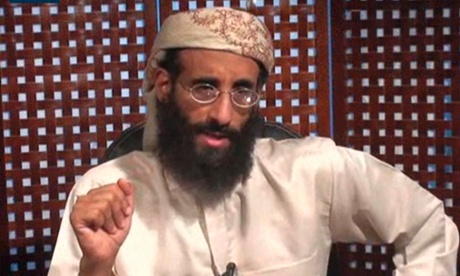The Guardian (UK)
ReutersApril 5, 2014.
Judge dismisses lawsuit over death of Anwar al-Awlaki and two others in Yemen, saying it is a matter for Congress
Anwar al-Awlaki, a US citizen, was killed in an
American drone strike in Yemen. (Photograph: AP)
A US federal judge has dismissed a lawsuit filed against the government by the families of three American citizens killed by drones in Yemen, saying senior officials cannot be held personally responsible for money damages for the act of conducting war.Read the rest here.
The families of the three – including Anwar al-Awlaki, a New Mexico-born militant Muslim cleric who had joined al-Qaida's Yemen affiliate, as well as his teenage son – sued over their 2011 deaths in US drone strikes, arguing that the killings were illegal.
Judge Rosemary Collyer of the US district court in Washington threw out the case, which had named as defendants the former defence secretary and CIA chief Leon Panetta, the former senior military commander and CIA chief David Petraeus and two other top military commanders.
"The question presented is whether federal officials can be held personally liable for their roles in drone strikes abroad that target and kill U.S. citizens," Collyer said in her opinion. "The question raises fundamental issues regarding constitutional principles and it is not easy to answer."
But the judge said she would grant the government's motion to dismiss the case.
Collyer said the officials named as defendants "must be trusted and expected to act in accordance with the US constitution when they intentionally target a US citizen abroad at the direction of the president and with the concurrence of Congress. They cannot be held personally responsible in monetary damages for conducting war."
Awlaki's US-born son Abdulrahman al-Awlaki was 16 years old when he was killed. Also killed was Samir Khan, a naturalised US citizen who had moved to Yemen in 2009 and worked on Inspire, an English-language al-Qaida magazine.
The American Civil Liberties Union and the Centre for Constitutional Rights, both based in New York, represented the families. They had argued that in killing American citizens the government violated fundamental rights under the US constitution to due process and to be free from unreasonable seizure.
"This is a deeply troubling decision that treats the government's allegations as proof while refusing to allow those allegations to be tested in court," said ACLU lawyer Hina Shamsi. "The court's view that it cannot provide a remedy for extrajudicial killings when the government claims to be at war, even far from any battlefield, is profoundly at odds with the Constitution."
Centre for Constitutional Rights lawyer Maria LaHood said the judge "effectively convicted" Anwar al-Awlaki "posthumously based solely on the government's say-so". LaHood said the judge also found that the constitutional rights of the son and of Khan "weren't violated because the government didn't target them".
"It seems there's no remedy if the government intended to kill you, and no remedy if it didn't. This decision is a true travesty of justice for our constitutional democracy and for all victims of the US government's unlawful killings," LaHood said.
*****
Comment: So much then for the often touted nonsense of checks and balances in American style democracy.What this judgement represents is the troubling reality that if you are a Muslim - or any other deemed undesirable - the US government can kill you and it matters little if you are a citizen or not.
It also matters very little if the US 'accidentally' eliminates any other undesirables while killing those on its Tuesday assassination list.
What a blatant disregard for even the most basic tenets of human rights based democracy.
Onward!

No comments:
Post a Comment